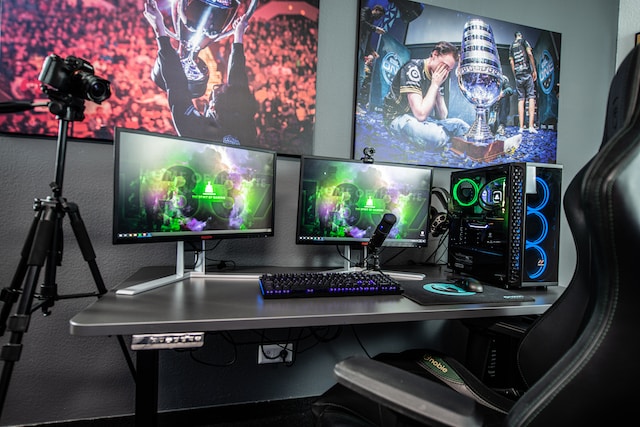Previously mainly focused on gaming tournaments, the esports sector has grown into an expansive entertainment powerhouse combining gaming, music, and pop culture.
As the business has grown, music has become a crucial component of esports events, improving the audience experience and broadening the industry’s cultural impact. From live performances by world-renowned musicians to in-game music inclusion, esports and music have formed a symbiotic connection that enhances gaming events’ thrill and emotional depth.

Live Performances at Major Esports Events
Music performances have become a key element of major esports events, transforming these competitions into full-fledged entertainment experiences. One of the best examples is the League of Legends World Championship, where live performances serve as dynamic opening ceremonies and halftime shows.
High-profile artists like Imagine Dragons, who debuted their song Warriors at Worlds 2014, set a precedent for blending live music with esports. Since then, performers such as Zedd, Chrissy Constanza, and, more recently, Lil Nas X have taken center stage, turning these events into cultural spectacles.
Lil Nas X headlined the World 2022 ceremony with his track STAR WALKIN’, captivating fans with a live performance that resonated with gamers and mainstream audiences alike.
These performances not only amplify the atmosphere but also attract non-gaming audiences who are fans of the artists, broadening the event’s appeal. They mirror traditional sports events like the Super Bowl halftime show, where entertainment complements the competition.
Custom Soundtracks and Theme Songs
Game publishers, particularly Riot Games, have mastered integrating custom soundtracks to elevate their esports events. League of Legends has led the way, crafting iconic anthems for each World Championship.
Imagine Dragons’ “Warriors,” released for Worlds 2014, became a rallying cry for players and fans, encapsulating the intensity of the competitive atmosphere. Riot has continued this trend with many collaborations with artists such as The Glitch Mob, Zedd, and Lil Nas X, who released “STAR WALKIN’” as the 2022 Worlds Anthem.
Fans associate these anthems with key moments of their favorite esports memories, enhancing the emotional connection to the game. Riot Games’ ability to create memorable soundtracks has helped them stand out, offering a unique narrative layer to their competitive scene. For a deeper dive into the esports experience, using the DraftKings promo code can add an extra dimension to the thrill, allowing fans to engage more directly with the games they love.
Each song complements the tournament’s visuals and emotional highs, transforming them into enduring symbols of esports glory.
In-Game Music Addition
In-game music integration is another avenue where esports and music intersect creatively. One of the standout examples is Fortnite’s virtual concert series, which blurred the lines between gaming and live performances.
Travis Scott’s Astronomical event in 2020 attracted millions of players, offering an interactive, immersive experience where the game world morphed in response to the music. Players didn’t just watch a concert—they became part of it, controlling avatars that interacted with stunning visual effects in sync with the performance.
Similarly, League of Legends introduced K/DA, a virtual K-pop group of in-game champions, further blending music and gaming. The group’s debut track, “POP/STARS,” quickly went viral, highlighting how virtual idols can captivate both gaming and music audiences.
Collaborations Between Musicians and Esports Organizations
More musicians are recognizing the potential of esports to connect with new audiences, leading to groundbreaking collaborations with esports teams and organizations. Artists like Drake and The Weeknd have invested in teams such as 100 Thieves and OverActive Media, showing the growing synergy between music and gaming.
These partnerships are mutually beneficial—musicians tap into the vast, young audience of eSports, while teams gain cultural capital through association with popular music icons.
Drake’s involvement with 100 Thieves gave the organization a massive boost in visibility and legitimacy, as his star power helped attract media attention and a broader fanbase.
These collaborations often go beyond simple sponsorships involving joint events, merchandise, and exclusive content like team-specific soundtracks. It helps eSports transcend the gaming world and reach mainstream cultural prominence, while musicians enjoy increased engagement with a tech-savvy, global.
Music as a Branding Tool for eSports Teams and Players
Music is becoming a key branding tool for eSports teams, helping them craft unique identities that resonate with fans. One prominent example is G2 Esports, which has released multiple songs that align with their team’s edgy and irreverent brand. By producing their music, teams like G2 are not only creating additional content for their audience but also reinforcing their brand image across social media and streaming platforms.
On a more individual level, players also use music to enhance their personal brand. Many streamers and pro players share curated playlists, collaborate with DJs, or even host live music sessions on their channels, offering fans insight into their tastes and personalities. This not only helps humanize players but also creates new opportunities for partnerships with musicians and record labels.
Music Festivals and eSports Crossover Events
Fusing music festivals and eSports tournaments is a natural progression as both industries seek to create more immersive and multifaceted entertainment experiences.
Events like DreamHack, one of the largest digital festivals in the world, combine live gaming competitions with music stages, offering fans a day packed with their favorite games and live performances.
TwitchCon and other gaming conventions have also embraced live music performances, often featuring DJ sets, concerts, and other musical acts to complement the gaming action.
By offering a full entertainment package, these events provide something for everyone, making them more appealing to a broader audience. The rise of hybrid eSports-music events highlights the growing synergy between the two industries, creating new opportunities for artists, players, and fans.
Conclusion
The eSports sector, which was previously mainly focused on gaming tournaments, has grown into an expansive entertainment powerhouse that combines gaming, music, and pop culture. From live performances by world-renowned musicians to in-game music integrations, eSports and music have formed a symbiotic connection that enhances gaming events’ thrill and emotional depth.
















